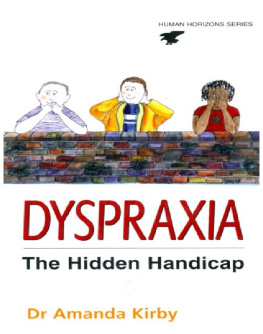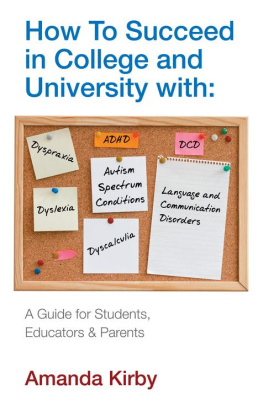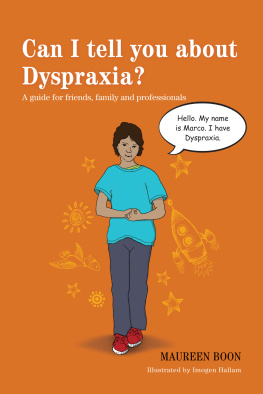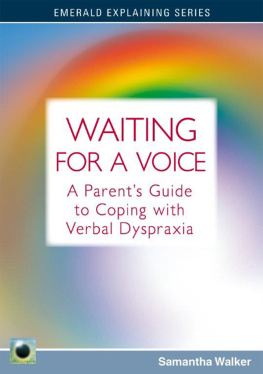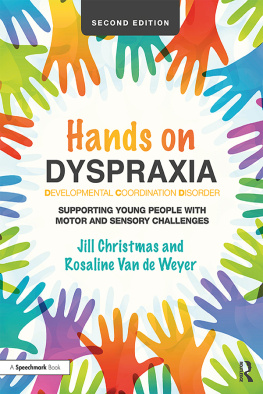Acknowledgements
I would like to thank Healthcall, and all the staff at the Healthcall Dyscovery Centre, without whom I could not have written this book. They have been my strength. They are just as enthusiastic about helping these very special children as I am.
I would also like to thank my long-suffering family, especially my son Andrew who has dyspraxia, without whom I would never have got involved in this area of childrens health. He gave me the drive to find out what I could do to solve some of our own problems as a family, and made me feel so passionately about these children. I continue to learn a great deal from him about the deep feelings and special qualities these children have. I would also like to thank the hundreds of parents I have spoken to about their own experiences as children as well as being parents of children with dyspraxia. I learn from you every day.
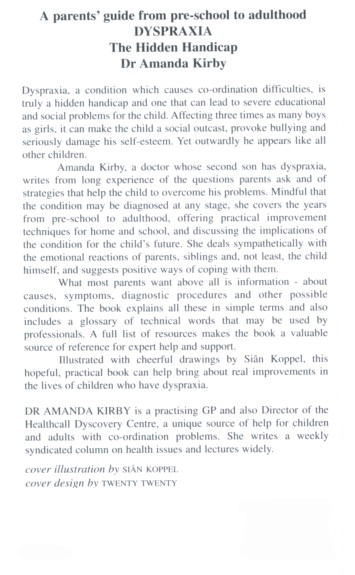
HOW TO SUCCEED IN COLLEGE AND UNIVERSITY WITH SPECIFIC LEARNING DIFFICULTIES:
A Guide for Students, Educators & Parents
Amanda Kirby
For any adult with specific learning difficulties going to college or university can be a challenge. These can present in the work and home setting, learning new skills, meeting new people, and coping with a new environment. From study skills to budgeting, from cooking to relationships, Amanda Kirby identifies routes to success in both education and socially. At the heart of this book is its practical approach to provide information and advice that is easy to access and to use.
Covering the full range of learning difficulties that students may have: from those on the autism spectrum, dyslexia, ADHD, communication disorders, dyscalculia and dyspraxia
Includes recommended free apps and software
Drawing on decades of practical, professional and academic experience Amanda Kirby provides solutions that are not only very accessible but also directs you to further reading and resources including apps and websites. Having this information all in one place is like a gold mine, as it has been previously scattered and very hard to find.
What are Specific Learning Difficulties?
Preparing for College and University.
Getting and Staying Organised.
Independent Living.
Study Skills.
Socialising and Feeling Good.
Preparing for the Workplace.
Useful contact organisations.
Specifically designed to be dyslexic friendly
HOW TO SUCCEED IN EMPLOYMENT WITH SPECIFIC LEARNING DIFFICULTIES:
A Guide for Employees and Employers
Individuals with specific learning difficulties can often find preparation for entering the workplace difficult while employers can struggle to understand the issues, as well as the strengths, these individuals will bring. In this guide, Amada Kirby outlines how employers can work with potential employees to enhance the workplace and their business.
Covering the full range of learning difficulties that the employee may have: from those on the autism spectrum, dyslexia, ADHD, communication disorders, dyscalculia and dyspraxia
Includes recommended free apps and software
From advice on how to prepare for an interview, meeting new people and creating a successful work-life balance to the employers responsibilities under the Equality Act and the training employees may need to work to their full potential How to Succeed in Employment is an easy to use and practical handbook based on Amada Kirbys decades of professional, and personal, research and experience.
What are Specific Learning Difficulties?
Preparing for the workplace.
Finding a job and the support available to help.
Interviews.
In the job, etiquette and dealing with others.
Organising your time at work.
How technology can help.
Getting organised at home and looking after yourself.
Socialising in and out of work.
Mental health and wellbeing.
Guidance for the employer the Equality Act and building best practice policy.
Useful organisations that can help.
Specifically designed to be dyslexic friendly

1 The Child and the Family
Mothers of children with problems carry a tremendous emotional load. Few occupations carry as much and those that do carry a different kind. Fathers of neurologically handicapped children do not escape from the burden, but they carry it differently.
(A. Jean Ayres, PhD, Sensory Integration and the Child)
What do parents feel when they are given the diagnosis of dyspraxia or DCD or, worse, no label at all? What effect does this have on parents or carers, not to mention the individual?
Parents are usually seen in a childrens centre and a paediatrician will tell them what is wrong. If she does not give a specific label she may just describe the problem. The parents often have insufficient time to consider what questions to ask and may go away feeling mystified, not really understanding what they have been told. They may not know how to help their child and could be unaware of the implications. They may have other children and are likely to be comparing the child to them. As they leave the centre they may experience a flood of emotion and feel that they dont know what to do or where to turn. All the problems of school and home still remain to be worked out. What does it mean now? What does it mean for their childs future?
HOW DO PARENTS FEEL?
Before parents have been given a diagnosis they already know that their child is different from other children and they can see that he or she has some difficulties. When they decide to have their child tested they expose themselves to a range of emotions. If you are a parent, not only of a child with co-ordination difficulties, but also of a child who is different from the average, you may feel some of the following emotions:

Frustration. Why has it happened to me? Who should I turn to for help? I dont understand what is wrong. If only he (or she) tried harder I am sure he could ride his bike.
Anger. Why me? Why dont my friends have the same problems that we have? I feel angry with my husband; he doesnt seem to understand what I have to go through, having a child with all sorts of difficulties and trying to cope with the rest of the family Everyone thinks I am just making it up.

Guilt. It must be something I did wrong. Maybe I didnt eat properly during the pregnancy; maybe the delivery was too fast or too slow. Perhaps it is something in my genes. Sometimes I shout at my son, and afterwards I feel that I shouldnt have, but I just cant see why he cant do some of the simplest things.
Isolation. We feel as if we are the only people in the world with a child with these problems, and nobody else seems to understand My child looks normal, but I know he is different. I wish I could talk to someone about it.
Ignorance. What should I do to get help? Who should I turn to? There seems to be little information around.

